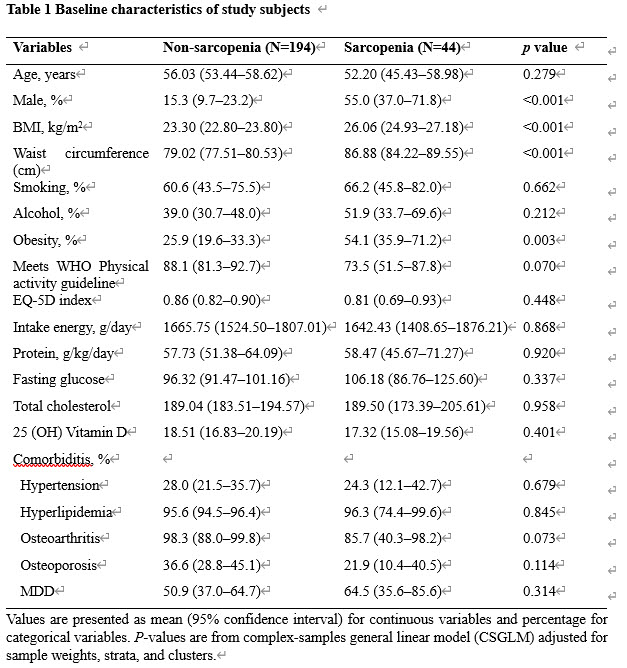Session Information
Date: Tuesday, October 28, 2025
Title: (2227–2264) Rheumatoid Arthritis – Diagnosis, Manifestations, and Outcomes Poster III
Session Type: Poster Session C
Session Time: 10:30AM-12:30PM
Background/Purpose: Sarcopenia is a medical condition characterized by the progressive loss of skeletal muscle mass, strength, and function. It is primarily associated with aging, but is also influenced by chronic diseases, malnutrition, and physical inactivity. In the absence of timely and adequate management, sarcopenia can impair the ability to perform activities of daily living, contributes to mobility limitations, and leads to a reduced quality of life. Sarcopenia is a prevalent but often underrecognized comorbidity in patients with rheumatoid arthritis (RA). In this study, we aim to investigate the risk factors associated with sarcopenia in patients with RA.
Methods: We analyzed data from the 2008–2011 Korea National Health and Nutrition Examination Survey (KNHANES) to investigate factors associated with sarcopenia in RA patients. Sarcopenia was defined based on appendicular skeletal muscle mass (ASM) adjusted for body weight using the formula ASM/weight * 100, with cutoffs of < 29.0% for men and < 22.9% for women. Obesity was defined as a body mass index (BMI) ≥ 25 kg/m², according to the Asia-Pacific criteria. Multivariate logistic regression was used to identify independent predictors of sarcopenia, incorporating sample weights and complex survey design.
Results: Among 238 RA patients included in the analysis, 44 (18.5%) had sarcopenia. The sarcopenia group had a significantly higher proportion of males (55.0% vs. 15.3%, p < 0.001), higher BMI (26.06 vs. 23.30 kg/m², p < 0.001), and greater waist circumference (86.88 vs. 79.02 cm, p < 0.001) compared to the non-sarcopenia group. In multivariate logistic regression adjusted for age, sex, obesity, physical activity, and daily protein intake, male sex (OR 4.17, 95% CI 1.48–11.77, p = 0.007) and obesity (OR 3.06, 95% CI 1.16–8.07, p = 0.024) were independently associated with sarcopenia. Adherence to the World Health Organization (WHO) physical activity guidelines was associated with a trend toward a protective effect, although the association did not reach statistical significance (OR 0.39, 95% CI 0.14–1.06, p = 0.064).
Conclusion: Male sex and obesity are significant factors associated with sarcopenia in Korean patients with RA. These findings underscore the critical role of male sex and obesity in the development of sarcopenia in RA patients. Future studies should explore the mechanisms underlying these associations and investigate the effectiveness of targeted interventions to mitigate sarcopenia in this population.
 Values are presented as mean (95% confidence interval) for continuous variables and percentage for categorical variables. P-values are from complex-samples general linear model (CSGLM) adjusted for sample weights, strata, and clusters.
Values are presented as mean (95% confidence interval) for continuous variables and percentage for categorical variables. P-values are from complex-samples general linear model (CSGLM) adjusted for sample weights, strata, and clusters.
.jpg) Values are presented as odds ratio (OR) with 95% confidence interval (CI) for univariate and multivariate logistic regression models. Multivariate analysis includes adjustments for age, sex, obesity, physical activity, and daily protein intake, along with sample weights, strata, and clusters based on the complex survey design.
Values are presented as odds ratio (OR) with 95% confidence interval (CI) for univariate and multivariate logistic regression models. Multivariate analysis includes adjustments for age, sex, obesity, physical activity, and daily protein intake, along with sample weights, strata, and clusters based on the complex survey design.
To cite this abstract in AMA style:
Oh Y, Hur J, Son C. Male Sex and Obesity Are Risk Factors for Sarcopenia in RA: Korea National Health and Nutrition Survey 2008–2011 [abstract]. Arthritis Rheumatol. 2025; 77 (suppl 9). https://acrabstracts.org/abstract/male-sex-and-obesity-are-risk-factors-for-sarcopenia-in-ra-korea-national-health-and-nutrition-survey-2008-2011/. Accessed .« Back to ACR Convergence 2025
ACR Meeting Abstracts - https://acrabstracts.org/abstract/male-sex-and-obesity-are-risk-factors-for-sarcopenia-in-ra-korea-national-health-and-nutrition-survey-2008-2011/
